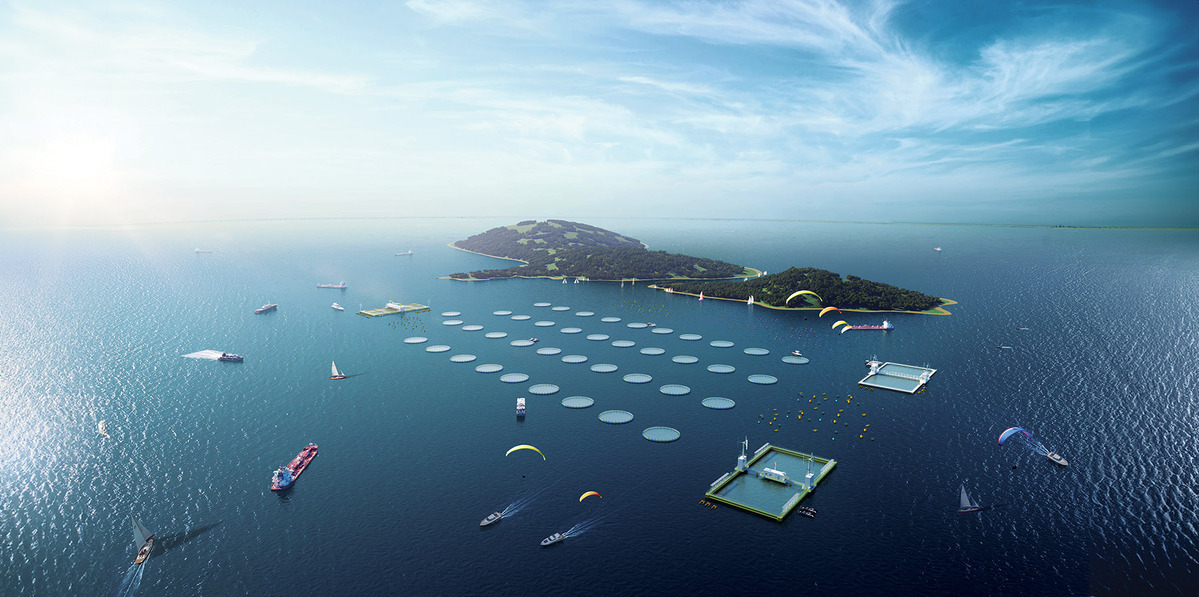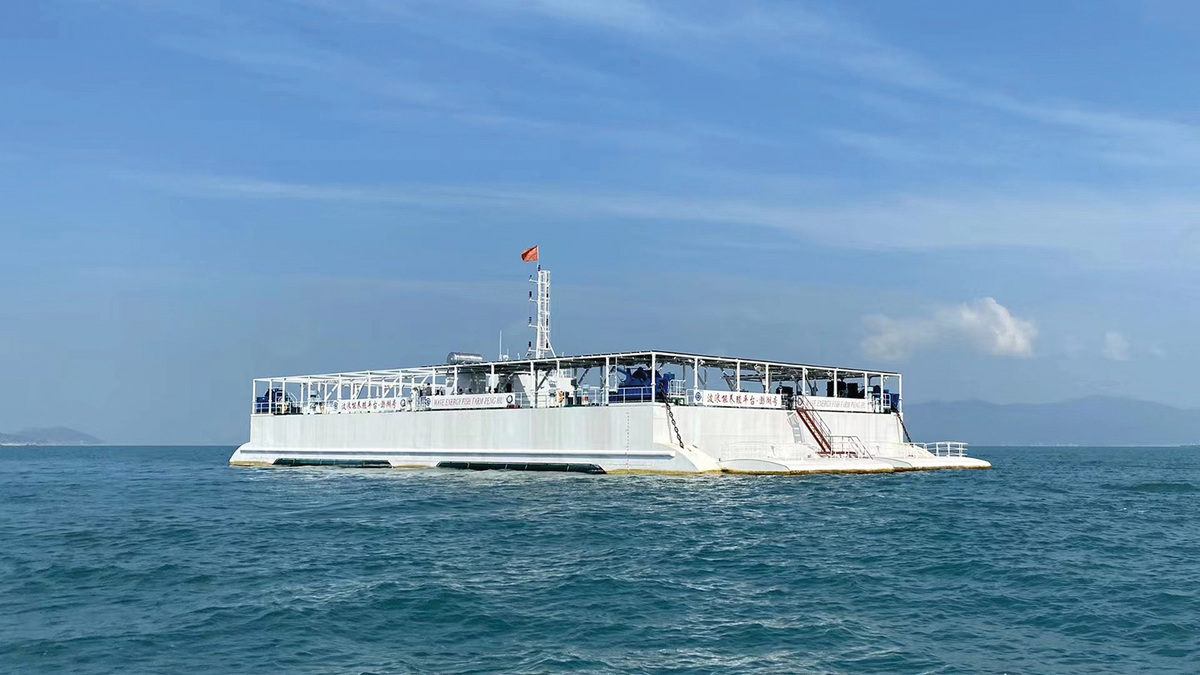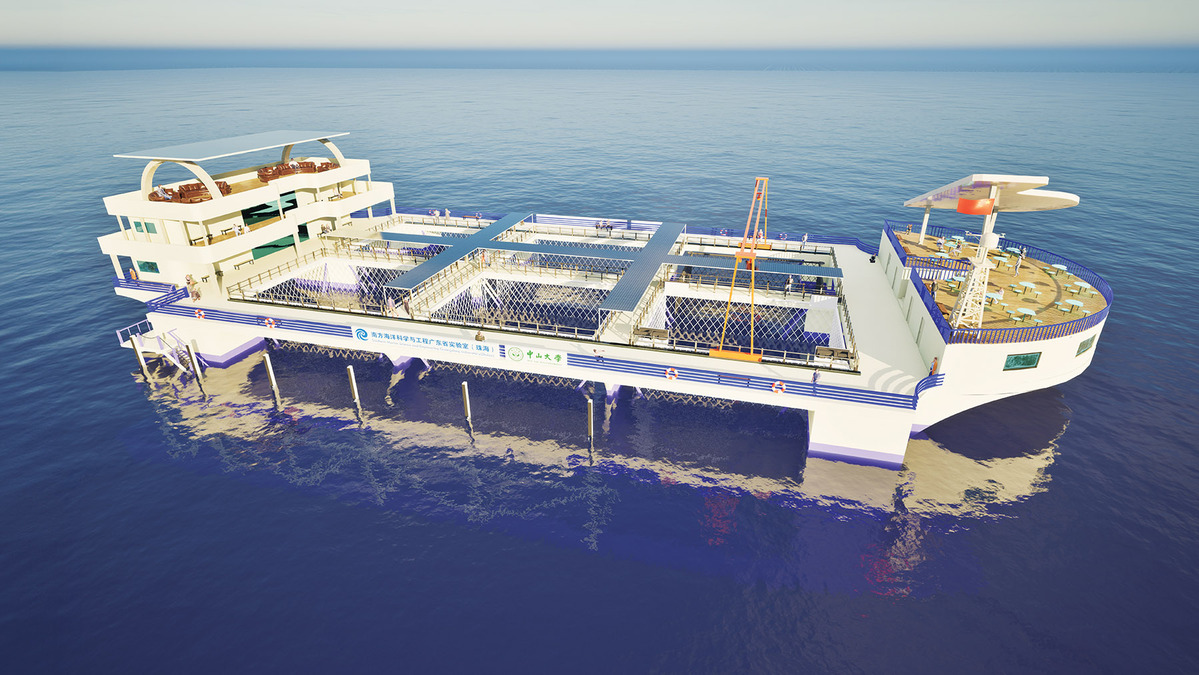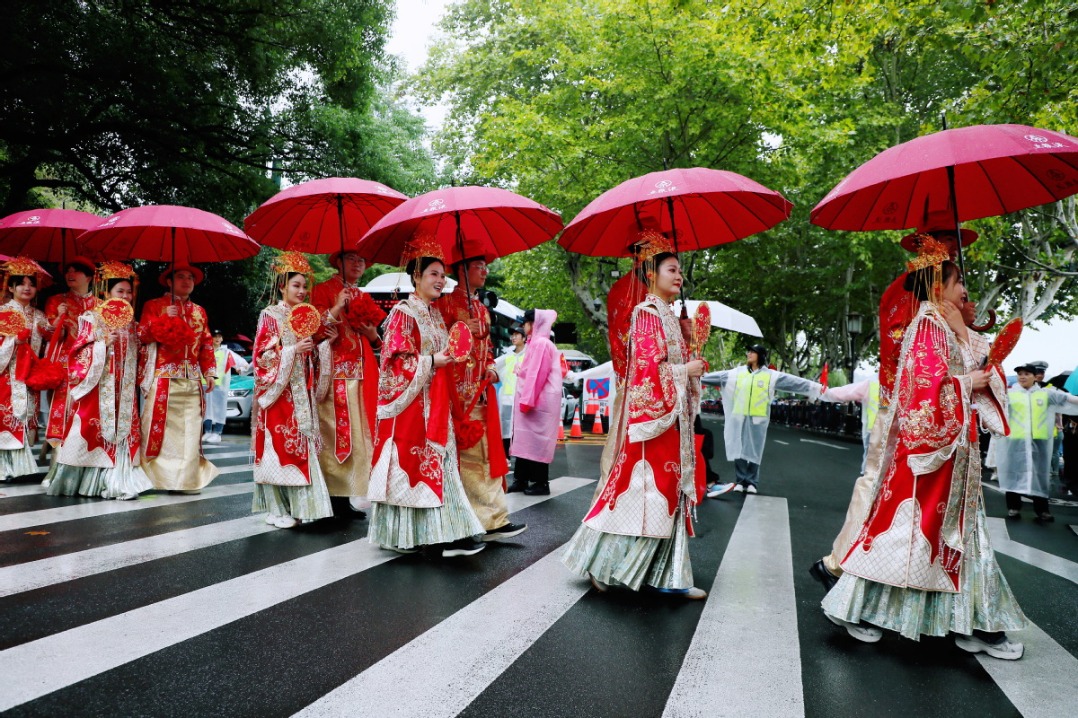Zhuhai riding the wave of the marine economy

The southern Guangdong city, with an expansive maritime area and a lengthy coastline, is stepping up efforts to be a marine business hub and the nation's 'capital of water sports'. Li Xiaoyun and Chai Hua report from Zhuhai.

Editor's note: February marks the fifth anniversary of the publication of the "Outline Development Plan for the Guangdong-Hong Kong-Macao Greater Bay Area". In the ninth in China Daily's series on the most intriguing stories to come out of the Greater Bay Area cities within the past five years, we provide a close-up view of Zhuhai's achievements in marine economy. At the same time, the construction of Haiji-2 and the in-depth integration with Macao will also offer broader possibilities for its development.
Zhuhai — a coastal city in southern Guangdong province adjacent to the Macao Special Administrative Region — is leveraging its vast maritime territory to propel its development as a hub for the marine economy, centering on marine aquaculture and equipment, as well as tourism and sports.
Zhuhai boasts having the largest maritime and island areas, as well as the longest coastline, in the Pearl River Delta region. Covering an expansive maritime area of 9,348 square kilometers and stretching along a 691-kilometer-long coastline, Zhuhai is home to 262 islands.
The marine industry contributed to about a quarter of the city's gross domestic product, which surpassed 420 billion yuan ($58 billion) in 2023.
The Zhuhai government underscored its unwavering commitment to advancing the marine economy in its work report on Jan 30. The document says Zhuhai intends to accelerate the construction of a modern marine metropolis with local characteristics, focusing on key areas like marine aquaculture, marine equipment and tourism.
The report painted a rosy picture for developing marine aquaculture in 2024. The city aims to forge ahead with the establishment of two national-level marine aquaculture demonstration zones in the Wanshan and Wailingding waters. Efforts will be intensified to ensure the construction of 20 reserve marine fishery projects, with a total investment of 20.3 billion yuan.
Zhuhai has great potential and advantages in developing marine aquaculture, says Wei Shunbing, an executive of Zhuhai Ocean Development Group.
Although Guangdong tops the nation in fishery products, its marine aquaculture sector ranks third. Recognizing the discrepancy, Wei says the province, as a long-standing leader in aquaculture, should strive for greater achievements in deep-sea aquaculture.

Unique advantages
Zhuhai's strategic location makes it ideal for marine aquaculture. With a marine area of more than 9,000 square kilometers — about 5.4 times the city's land area — Zhuhai enjoys ample space for deep-sea fisheries. "The Guangdong-Hong Kong-Macao Greater Bay Area (GBA) population of over 86 million offers a vast consumer market, ensuring strong demand for aquaculture products," Wei says.
Named after its location at the mouth of the Pearl River, Zhuhai benefits from a confluence of fresh and salt water, providing a favorable environment for the fish farming due to its rich diversity of microorganisms and nutrients.
To better leverage its natural advantages in developing deep-sea and far-sea aquaculture, Wei introduced Zhuhai Ocean Development Group adopts a "standard sea" approach to develop its marine ranches by designating a one-square-kilometer ocean area as a prototype. Equipped with fish cages, automated feeding facilities, as well as intelligent infrastructure for monitoring water temperature, salinity and fish density, the prototype can be replicated in other waters suitable for fish farming.
With the concept of "standard sea" and fish cages as its core facilities, Zhuhai's first modern industrial park for ocean ranches began construction on March 20, and is expected to offer an aquaculture area of 240,000 cubic meters. The use of submerged or semi-submerged fish cages allows fish to grow in an almost natural marine environment so their taste and texture is comparable to wild ones, according to Wei.
Dehai One is a marine aquaculture platform in Zhuhai featuring four large fish cages. After six months of deep-sea cultivation, one of the cages yielded a harvest of around 100,000 pounds of high-quality golden pomfret in March last year.
In addition, deep-sea aquaculture holds the potential to drive the transformation and modernization of the fishery industry, as it equips fishers with the ability to better withstand risks such as typhoons, Wei says.
Wang Shen, deputy general manager of Guangdong Dalinyang Marine Biology, has first-hand experience with typhoons that frequently affect the waters around Zhuhai. Typhoon Hato swept through the region in 2017, causing extensive damage to mariculture rafts. Wang, who was pursuing a master's degree in aquatic biology at Sun Yat-sen University, was involved in a research project that was affected by the typhoon.
Wang and his team are now responsible for operating the world's first semi-submersible aquaculture platform powered by wave energy, known as the "Penghu Hao". Compared to conventional offshore mariculture rafts, the platform operates at greater water depths and can help enhance resistance to winds and waves.
An upgraded version of the platform, called "Zhuhai Qin", is due to go into operation later this year, says Wang. The new platform not only incorporates disease and water quality monitoring laboratories, but also features a cost-effective design utilizing corrosion-resistant materials.
He says the technology model adopted by "Zhuhai Qin" can be commercialized, as his team has signed more than 10 technology agreements with companies in coastal provinces like Hainan and Fujian.

Multifaceted development
Tourism is considered another key driver of Zhuhai's marine economy. The number of visitors to the city's islands reached 1.64 million in 2023, doubling that of the previous year. Sanjiao Island — the geometric center of the GBA and China's first uninhabited island developed through the model of ecological restoration and tourism — has been open to the public since 2023.
In the waters west of Sanjiao Island, Zhuhai plans to build a "Marine Disneyland" — a floating platform featuring marine aquaculture, recreational fishing, an underwater park, hotels and restaurants.
Integrating tourism and engineering with deep-sea aquaculture reflects the Zhuhai government's vision for the marine economy.
Sports have also been an integral part of the development of Zhuhai's marine industry. Sailing in particular is growing rapidly, thanks to Zhuhai's unique cultural heritage and abundant natural resources — a city with the largest maritime area, the highest number of islands, and the longest coastline in the Pearl River Delta.
In March, yacht fleets of the Clipper Round the World Yacht Race — one of the world's most influential sailing events — berthed at Zhuhai as a host port and team partner.
A team named after Zhuhai sailed into its home port for the first time in the Clipper Race. James Finney, skipper of the Zhuhai fleet, told China Daily it was his first visit to Zhuhai and China. He said he was very impressed by the facilities he had seen. "The marina is massive, and the facilities on the shore are fantastic. I believe they could easily be among the best in the world."
"Zhuhai is located in the delta of the Pearl River, and that's perfect for sailing because we can be out at sea very quickly. That's a huge advantage," says Finney, adding he hopes to make more visits in the future.
Hu Diya, general manager of the event's local organizer, Zhuhai Jiuzhou Navigation Culture Center Co, believes that such an event can encourage more local residents take up water sports and join more international sports contests along the city's coastline to strengthen the development of the marine industry.
Sailing has become a prominent and an internationally recognized feature of Zhuhai. The city has hosted an increasing number of high-level sailing events.
The Zhuhai government signed a cooperative framework agreement last year with the Chinese Yachting Association and Zhuhai Jiuzhou Holdings Group to establish the southern headquarters base of the Chinese Yachting Association in the city. The goal is to turn Zhuhai into the "capital of sailing and windsurfing" in China.
The association is drafting a long-term plan to organize more international sailing activities along the southern coast to enable more young people to experience the sport.
But, Zhuhai isn't the only city that's keen to tap the marine industry's economic potential. Shanghai, Qingdao in Shandong province, and Tianjin along the nation's eastern coast have recorded higher marine economic production than Zhuhai, and have made progress in specific sectors, such as offshore oil and gas extraction, as well as marine engineering.
Zhuhai is determined to catch up in a highly competitive landscape.
Contact the writers at irisli@chinadailyhk.com























